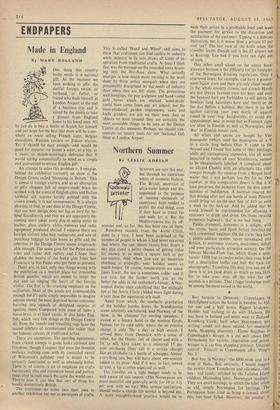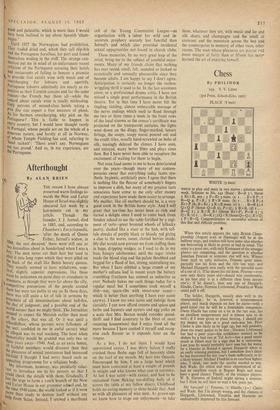Northern Summer
By LESLIE ADRIAN
SUNTANS are rare this year, but through no capricious whim of cosmetic fashion. The British, uncertain of ultra-violet lamps and dis- appointed in the promise of .tanning chemicals of yesteryear, have tended to prefer the real thing, even if they have to travel far and wide for it. But the
Mediterranean has its off- seasons and, so far, this has been one of them.
Returning recently from the Arctic Circle, done to a turn, I have been surprised at the number of people to whom it had never occurred that where the sun shines twenty-four hours a day you stand a better chance of getting value for money at so much a square inch or per sun-minute. And when you can go mountain climbing at midnight, your holiday seems so much longer. Of course, temperatures are some- times lower, the sea is sometimes colder and it can rain, but the farther north you go the better the odds in the sunbather's favour. A Nor- wegian divine once calculated that the midnight sun at the Arctic Circle yielded more light during a year than the equatorial orb itself.
Apart from which, the southerly gravitation of the holiday hordes leaves the Scandinavian scene relatively uncluttered, and Norway, of the three, is the cheapest for sterling spenders. I stayed at a luxury hotel in the western fjords, famous for its cold table, where the en pension charge is only 70s. a day in high season. I arrived there from Denmark with a sense of relief, for the Danes, full of charm and with a lot to sell, have taken to a universal 15 per cent surcharge (they call it a service charge) like an alcoholic to a bottle of schnapps. Almost everything you buy will have about one-seventh added to its price. And if it was, in fact, served to you, a tip is often expected as well.
The traveller on a tight budget needs to be well aware of this impost. (The Norwegians are more merciful and generally settle for 10 or 124 per cent with no tip.) Why service institutions should make a charge for service is beyond me. A more straightforward practice would be to
raise their prices to a profitable level and leave the payment for service to the discretion and satisfaction of the customer. Tipping is a dubious institution, but is it worse than a private 15 per cent tax? The last turn of the knife when the traveller leaves Danish soil is the £2 airport• tax at Kastrup. Too bad if you have run right out of cash.
One other small cloud on the sunny Scan- dinavian horizon is the difficulty for the foreigner of the Norwegian drinking regulations. Only a chartered town, for example, can have a govern- ment liqtior store and there are only about twenty in the whole country (towns, not stores). Hotels are not always licensed even for beer, and even the licensed bars are forbidden to sell spirits on Sundays (and. Saturdays here and there) or on the day before a holiday. But there is no law against carrying your own bottle of aquavit round in your bag. Incidentally, to avoid dis- appointment, bear in mind that in Finmark signs are often in Finnish as well as Norwegian, and `Bar' in Finnish means cafe.
All wines and spirits are bought by Vin- monopolet (which used the monogram of a V in a circle long before Olav V came to the throne) and I found that some of their bottlings, while not outrageously expensive, like all wines imported in bottle all over Scandinavia, seemed to be imaginatively labelled. A complaint about an alleged Chablis with an aftertaste like cider vinegar brought the opinion from a Bergen head waiter that it was perhaps too dry for us. One 'comfort in this comparative desert is that it at least preserves the motorist from the dire conse- quences of indulgence. A barman assured me that driving after just one bottle of weak Pilsener could bring an on-the-spot fine of £15 or even a week in the lock-up. And he added that he could himself be reprimanded 'for allowing a customer to drink and drive. On those twisting mountain highways, that is no bad thing.
Public transport, however, is a delight, with the trains, buses and fjord ferries interlocking with convenient neatness. On the trains they have a public-address system, never introduced into Britain, to announce stations, meal-times, delays and even particularly attractive scenery. On the famous Myrdal-Flam line, which drops a spec- tacular 3,000 feet in twelve miles, they even hand out a descriptive leaflet and halt the train for photography. Travelling this way, you can see all there is to, see (and drink as much as you like), for to take your eyes off the view for ten seconds is a mistake. That craggy landscape must be among the most varied in the world.
Best bargain in Denmark : Copenhagen to Helstrigborg across the Sound in Sweden, Is. 4d. for one and a half hours. Biggest let-down: Haridet had nothing to do with Elsinore. He was born in Jutland and never went to Zealand. Kronborg Castle, built when Shakespeare was writing, could not have existed for mediaeval Am:le. Shopping discovery: Illums Bogilhus in Copenhagen's Stroget is a cut well above Den Permanente for variety, inspiration and prices. Stroget is a car-free shopping precinct. Unusual aperitif : Frascati in Copenhagen offer `Pimp's No. 1.'
Best buy in Norway: the £800 mink coat in a shop at Bodo. But, seriously, I would suggest the pewter from Trondheim and elsewhere. Odd buy: cod candy, relished by the Lofoten Island children. Misleading label: Norwegian 'sardines. They are small herrings, to which the label refers as sild, simply Norwegian for herrings. The Portuguese have tried to bring a lawsuit about this, but have failed. However, the product is good and palatable, which is more than I would have been inclined to say about Spanish `cham- Pagne.'
Until 1927 the Norwegians had prohibition. They traded dried cod, which they call clip-fish and the Portuguese bacalhau, for port and found themselves wading,in the stuff. The strange con- nection put me in mind of an unfortunate recent criticism of the Portuguese accusing their hotels and restaurants of failing to honour a promise to provide free carafe wine with meals and of overcharging for lobsters and aperitifs. Portuguese lobsters admittedly are nearly as ex- Pensive as their Cornish cousins and for the same
tea 30n—the French buy them all—while the•canard about carafe wine is totally misleading.
Only patrons of second-class hotels taking a Prix fixe can expect a free measure of plonk. 1,s for barmen overcharging, why pick on the rorfuguese? This is liable to happen in every country, but I would have thought rarely in Portugal, whose people are on the whole of a generous nature, and hardly at all in Norway, of whom Temple Fielding has said, referring to local oc
al rackets': 'There aren't any. Norwegians are too proud.' And so, in my experience, are IA Portuguese.































 Previous page
Previous page